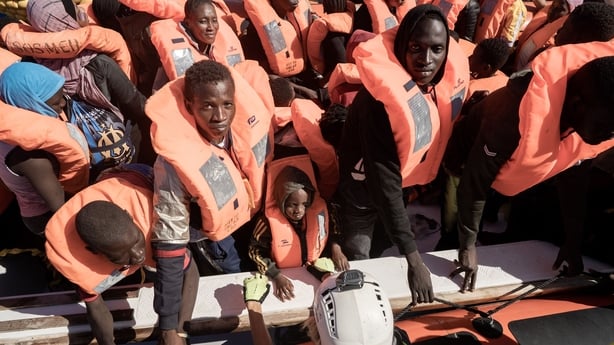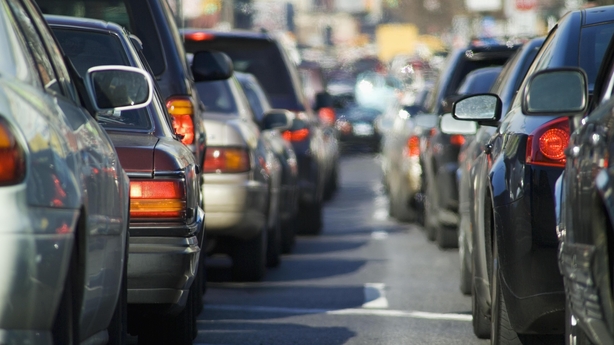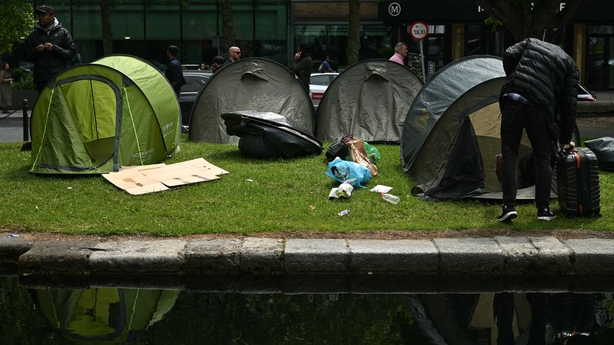Immigration is one of a number of issues in the minds of voters in the lead up to the General Election.
Ireland welcomed refugees from Ukraine when war broke out in 2022 but at the same time, the number of asylum seekers also grew. This put the State's immigration system under strain.
And as protests at planned International Protection Accommodation Services (IPAS) centres at times turned ugly, many in local areas claimed they were not consulted and that legitimate concerns were ignored or drowned out by those with different agendas.
Social Affairs Correspondent Ailbhe Conneely looks at how this complex issue is likely to be a factor when the country goes to the polls on 29 November.
Immigration has been a key issue in elections worldwide this year and Ireland is no different.
The impact of global migration and the war in Ukraine have dominated public discussion and political commentary, and there is more to come.
Despite a plan by the outgoing Government to end direct provision, it was abandoned due to unprecedented numbers arriving.
The proposed model outlined in the White Paper was designed to accommodate 3,500 applicants annually.
It was published in October 2020 during the Covid-19 pandemic.
The number of people seeking international protection that month was 1,342.
By October 2022 it had risen to 11,142, by which stage the scale of migration was evident across Europe.

The Russian invasion of Ukraine in February that year resulted in hundreds of thousands of refugees fleeing to EU countries where they were supported through the Temporary Protection Programme.
Small talk with a government advisor at a pedestrian light at the time revealed that there was an expectation that 10,000 Ukrainians could seek refuge in Ireland.
That figure is now over 100,000.
Ireland of the thousand welcomes
In spring 2022, Irish people welcomed refugees by refurbishing convents and community halls to provide accommodation.
They welcomed new pupils and students into their local schools, clubs, and sports teams.
Most of the refugees became part of the local fabric of Irish life.
So much so, that - in recent months - community organisatons have fought to keep Ukrainian refugees in their towns and villages when the Department of Integration sought to move them on.
Questions were raised about the Government's integration policy, when so much hard work had been done on the ground.
The prospect of potential protectionism by communities that did not want idle buildings in their neighbourhoods, in case they would become International Protection Accommodation Service (IPAS) centres, was not vocalised.
Refugees from Ukraine, asylum seekers and people coming to Ireland for work resulted in a significant increase in immigration in the year to April 2023.
Crisis on top of crisis

With no collective means of overcoming the impact - and in some cases trauma - of Covid-19, the country went straight into a cost-of-living crisis, on top of a housing crisis, rising rents, increased homelessness and emigration.
As people arrived in Ireland seeking better lives, Irish citizens were questioning their own circumstances as they returned to offices in heavy commuter traffic and overcrowded public transport.
With direct provision at capacity, the Government had to accommodate asylum seekers - mainly single men - in vacant properties around the country, some in areas with few amenities.
A cohort of society that arguably didn't define itself as far left or far right raised concerns.
However, this was viewed as racist, which meant that 'concerns’ were left unanswered, creating a vacuum that enabled opportunistic bad actors to stoke tension and fear.
Aside from the TDs who were calling for a halt to the influx of asylum seekers, opposition parties did not seem to know where to land punches.

Some focused on the basic human rights of the asylum seekers, while others did not address the divisive issue of immigration at all.
The Department of Integration struggled to accommodate asylum seekers, with little help, it seemed, from other Government departments.
While most direct provision residents had full status, they would be on the streets if they moved out.
Some were eventually transferred to other centres around the country to make way for new arrivals, including mothers whose children found the experience of leaving their schools and their friends traumatic.
In December 2023, the Government made the decision to stop providing emergency accommodation to single male asylum seekers because of capacity.
Almost 3,000 remain unaccommodated today, which is nearly the same number of people the White Paper on Ending Direct Provision suggested would be housed under that plan.
Cold shoulders point to lasting divisions
A Government strategy on IPAS accommodation was published this year just months after Minister for Integration Roderic O'Gorman estimated that between 13,000 and 15,000 international protection applicants will likely be the ‘new normal’.
The strategy proposed to move away from full reliance on private providers - to whom millions of State money has been paid - towards a core of State-owned accommodation of 14,000 beds by 2028.
Thornton Hall was proposed; however, the Ministerial Order in relation to that site was revoked after locals sought a judicial review. A new order could be issued in the coming weeks. Either way, for now, it is delayed.
Minister O'Gorman told journalists during the summer that, after the initial arrival of people in communities, "everything settles down because all the worst fears put out through misinformation and disinformation online are never realised".
However, what is not discussed is the division and turmoil left in communities in the wake of these decisions.
Where integration has been a success, it is mainly down to the work of local volunteers, who in some places face intimidation and bullying from those who cannot come to terms with asylum seekers living in their area.
Division and distrust have been sown in communities amongst locals who in some cases no longer greet each other on the street.
The challenge for political parties and candidates in this election is balancing credible immigration policy proposals with International legal and human rights obligations.







